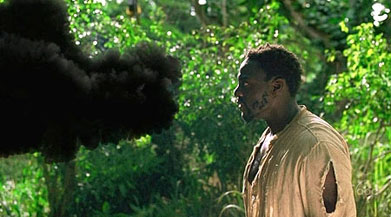Mythology
By Martin Felipe
April 29, 2009
One trend that really bugs me, and this is by no means limited to mythology shows, is sophomore season backlash. Almost without fail, once a show breaks through and has a particularly strong impact on the zeitgeist, the next season the Internet community laments a drop in quality. The poster boy for this phenomenon is Heroes, a show that was the classic embodiment of a water cooler hit in its first season, only to become a bit of a punchline ever since. But whatever, I don't think Heroes was all that good to begin with, so I'm not so sure that it really got worse, it's just that people started to realize how mediocre it had always been. No, the backlash that still annoys me to this day is the one that plagued Lost.
As most will remember, Lost debuted in 2004 to great acclaim and excellent ratings. It won the Emmy for best drama and, along with Desperate Housewives and Grey's Anatomy, was credited with ABC's comeback to relevance. Then season two rolled around and the grumbling started. People complained about the show's slow pace, the flashback structure, the piling on of mysteries, and Ana Lucia. The ratings started to sag, and the show wasn't even Emmy nominated, let alone did it repeat its win. Then came the almost show killing season three mini-season.
The first six episodes of the third season aired without interruption before a long break, after which the remaining episodes would also air uninterrupted. Well, those six got lambasted with such disdain that when Lost came back, the ratings plummeted and, to this day, haven't recovered. A strange thing happened, though. When Lost came back, opinions started to reverse. With the exception of the Jack tattoo episode and the Hurly van episode, the word-of-mouth started turning positive again. People really seemed to respond to the Desmond "you're gonna die, Charlie" story, they loved Juliet disrupting the endless Jack-Kate-Sawyer triangle, and Ben evolved into a fascinating villain for the ages. Even the derided addition of Nikki and Paulo ended in a clever way.
Then, midway through the season, ABC announced a planned end date for Lost. No longer facing the need to extend storylines indefinitely without an end in sight, Damon Lindelof and Carlton Cuse were now able to plow forward towards a conclusion; one, which they claim, has always been a part of the blueprint of the show. This more confident momentum has brought Lost back to favor. Season four, though, hit like all shows with the writers' strike, had glowing fan response and returned to Emmy territory. For that matter, season five has been hitting it out of the park as well. Problem is, despite its repaired reputation, the ratings are still struggling. And, despite positive current response, many fans still hold season one up as some model for perfect television, which no later season can possibly hope to meet.
Well, I've been rewatching early Lost. The thing is, season one is great, no doubt about it. It's just not better than what we're getting now. Nor is it really better than the maligned second season. Lost is like a novel. It's one story, broken into six chapters. The first chapter is exposition. Exposition, by its nature, is a bit dull. It sets up future developments, and introduces the world in which our characters will live. Not to mention the fact that it introduces the characters.
Continued:
1
2
|
|
|
|




